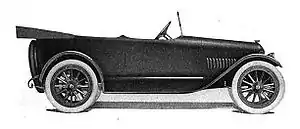Kline Kar
The Kline Kar was an American automobile built first in York, Pennsylvania, (1910–1912), and then in Richmond, Virginia, (1912–1923). The car was often just referred to as a Kline.

James A. Kline moved to York to work on a car that at the time was known as the York, but soon became the Pullman. After leaving that company, he partnered with another former employee, Samuel E. Baily, and also with Joseph C. Carrell to form B.C.K. Motor Company. This new firm produced the Kline Kar starting in 1910, in the building owned by Baily for his carriage company. Almost right away, the 6-cylinder cars were entered in auto races. There were two dirt track race cars called "Jimmy" and "Jimmy, Jr." after the chief designer and his son.[1] These race cars brought the company nationwide attention. They also drew the interest of a group of Richmond, Virginia, businessmen. They noted how well the Kline was selling in their state and eventually bought the company and moved it to Virginia. In Richmond, they reorganized as the Kline Motor Car Corporation and built a new factory in which to produce the car. This factory was located on the Boulevard, at the current site of the Greyhound bus station. Starting in November 1912, Klines were produced in Richmond, except for the engines brought in from Bath, New York, where the Kirkham Machine Company built them. This outsourcing was most likely to enable the new firm to enter mass manufacture quickly.[2]
The Kline was a pricey car and was marketed as a quality item. Indeed, the Model 6-50 runabout, which cost $2,585, was advertised as "one of the classiest roadsters brought out for several seasons... for a physician or a young man of fastidious taste."[2] The car was popular among Washington, DC, government employees and those in the equestrian field, such as jockeys and horse trainers. In 1915, the firm was in receivership, but it survived and two years later was making almost 500 cars in a single year. It appeared that the firm was now on a stronger footing, but the post-World War I recession again weakened the firm. The Kline now became an assembled car, which did not please James A. Kline much. From 1919, all Klines rode on a 121" wheelbase. Starting in 1920, a 3672cc Continental engine was offered, increasing to a 3959cc unit in 1923. Prices at this time ranged from $1,865 to $2,790.[2] The company ended in early 1924, but not before James Kline said of his beloved Kline Kar, "I would rather see my children dead than prostituted to cheapness and inferior workmanship."[2]
Notes
- Kimes, Beverly Rae. Standard Catalog of American Cars: 1805-1942 (Iola, WI: Krause, 1996), p.819.
- Kimes, p.819.
References
- G.N. Georgano, Nick (Ed.). The Beaulieu Encyclopedia of the Automobile. Chicago: Fitzroy Dearborn, 2000. ISBN 1-57958-293-1
- Kimes, Beverly Rae and Clark Jr, Henry Austin. Standard Catalog of American Cars: 1805-1942 (Third Edition). Iola, WI: Krause. 1996. ISBN 0-87341-428-4